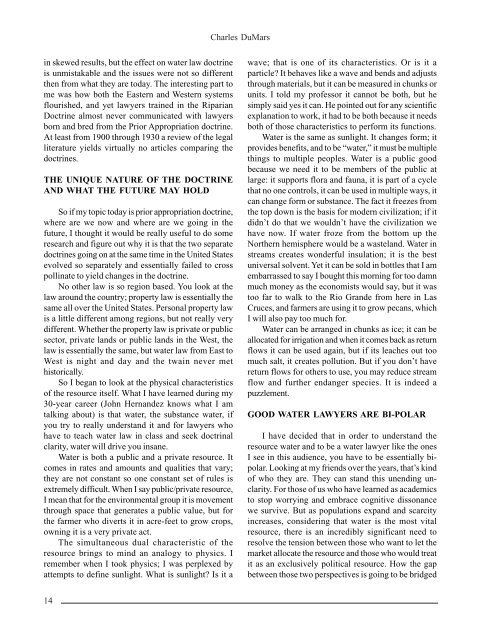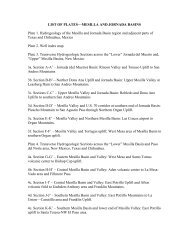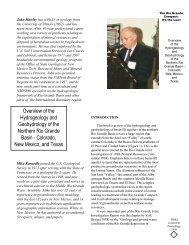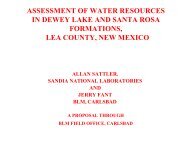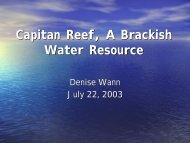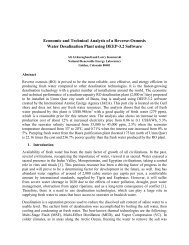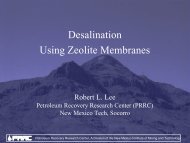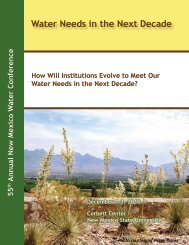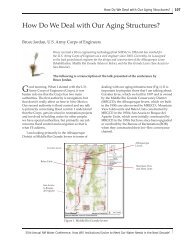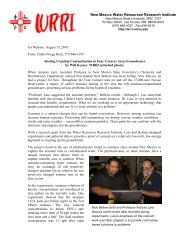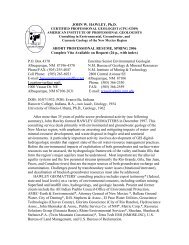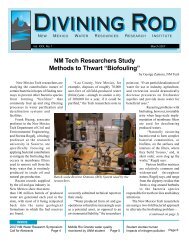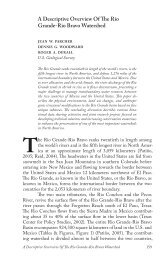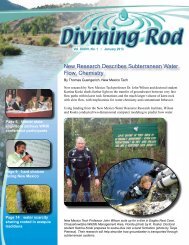Charles T. DuMars - Water Resources Research Institute
Charles T. DuMars - Water Resources Research Institute
Charles T. DuMars - Water Resources Research Institute
You also want an ePaper? Increase the reach of your titles
YUMPU automatically turns print PDFs into web optimized ePapers that Google loves.
<strong>Charles</strong> <strong>DuMars</strong><br />
in skewed results, but the effect on water law doctrine<br />
is unmistakable and the issues were not so different<br />
then from what they are today. The interesting part to<br />
me was how both the Eastern and Western systems<br />
flourished, and yet lawyers trained in the Riparian<br />
Doctrine almost never communicated with lawyers<br />
born and bred from the Prior Appropriation doctrine.<br />
At least from 1900 through 1930 a review of the legal<br />
literature yields virtually no articles comparing the<br />
doctrines.<br />
THE UNIQUE NATURE OF THE DOCTRINE<br />
AND WHAT THE FUTURE MAY HOLD<br />
So if my topic today is prior appropriation doctrine,<br />
where are we now and where are we going in the<br />
future, I thought it would be really useful to do some<br />
research and figure out why it is that the two separate<br />
doctrines going on at the same time in the United States<br />
evolved so separately and essentially failed to cross<br />
pollinate to yield changes in the doctrine.<br />
No other law is so region based. You look at the<br />
law around the country; property law is essentially the<br />
same all over the United States. Personal property law<br />
is a little different among regions, but not really very<br />
different. Whether the property law is private or public<br />
sector, private lands or public lands in the West, the<br />
law is essentially the same, but water law from East to<br />
West is night and day and the twain never met<br />
historically.<br />
So I began to look at the physical characteristics<br />
of the resource itself. What I have learned during my<br />
30-year career (John Hernandez knows what I am<br />
talking about) is that water, the substance water, if<br />
you try to really understand it and for lawyers who<br />
have to teach water law in class and seek doctrinal<br />
clarity, water will drive you insane.<br />
<strong>Water</strong> is both a public and a private resource. It<br />
comes in rates and amounts and qualities that vary;<br />
they are not constant so one constant set of rules is<br />
extremely difficult. When I say public/private resource,<br />
I mean that for the environmental group it is movement<br />
through space that generates a public value, but for<br />
the farmer who diverts it in acre-feet to grow crops,<br />
owning it is a very private act.<br />
The simultaneous dual characteristic of the<br />
resource brings to mind an analogy to physics. I<br />
remember when I took physics; I was perplexed by<br />
attempts to define sunlight. What is sunlight Is it a<br />
wave; that is one of its characteristics. Or is it a<br />
particle It behaves like a wave and bends and adjusts<br />
through materials, but it can be measured in chunks or<br />
units. I told my professor it cannot be both, but he<br />
simply said yes it can. He pointed out for any scientific<br />
explanation to work, it had to be both because it needs<br />
both of those characteristics to perform its functions.<br />
<strong>Water</strong> is the same as sunlight. It changes form; it<br />
provides benefits, and to be “water,” it must be multiple<br />
things to multiple peoples. <strong>Water</strong> is a public good<br />
because we need it to be members of the public at<br />
large: it supports flora and fauna, it is part of a cycle<br />
that no one controls, it can be used in multiple ways, it<br />
can change form or substance. The fact it freezes from<br />
the top down is the basis for modern civilization; if it<br />
didn’t do that we wouldn’t have the civilization we<br />
have now. If water froze from the bottom up the<br />
Northern hemisphere would be a wasteland. <strong>Water</strong> in<br />
streams creates wonderful insulation; it is the best<br />
universal solvent. Yet it can be sold in bottles that I am<br />
embarrassed to say I bought this morning for too damn<br />
much money as the economists would say, but it was<br />
too far to walk to the Rio Grande from here in Las<br />
Cruces, and farmers are using it to grow pecans, which<br />
I will also pay too much for.<br />
<strong>Water</strong> can be arranged in chunks as ice; it can be<br />
allocated for irrigation and when it comes back as return<br />
flows it can be used again, but if its leaches out too<br />
much salt, it creates pollution. But if you don’t have<br />
return flows for others to use, you may reduce stream<br />
flow and further endanger species. It is indeed a<br />
puzzlement.<br />
GOOD WATER LAWYERS ARE BI-POLAR<br />
I have decided that in order to understand the<br />
resource water and to be a water lawyer like the ones<br />
I see in this audience, you have to be essentially bipolar.<br />
Looking at my friends over the years, that’s kind<br />
of who they are. They can stand this unending unclarity.<br />
For those of us who have learned as academics<br />
to stop worrying and embrace cognitive dissonance<br />
we survive. But as populations expand and scarcity<br />
increases, considering that water is the most vital<br />
resource, there is an incredibly significant need to<br />
resolve the tension between those who want to let the<br />
market allocate the resource and those who would treat<br />
it as an exclusively political resource. How the gap<br />
between those two perspectives is going to be bridged<br />
14


